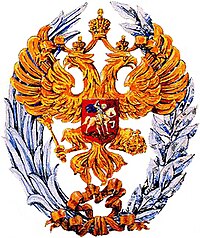Russian Federation State Prize
| State Prize of the Russian Federation | |
|---|---|
 |
|
| Awarded for | Outstanding contributions in (1) science and technology; (2) literature and arts; (3) humanitarian work |
| Country | Russia |
| Presented by | President of Russia |
| First awarded | 1992 |
The State Prize of the Russian Federation (Russian: Государственная Премия Российской Федерации, Gosudarstvennaya Premiya Rossiyskoy Federatsii; official translation in Russia: Russian Federation National Award) is a state honorary prize established in 1992 as the successor for the USSR State Prize following the breakup of the Soviet Union. In 2004 the rules for selection of laureates and the status of the award were significantly changed making them closer to such awards as the Nobel Prize or the Soviet Lenin Prize
Every year seven prizes are awarded:
Only three prizes for humanitarian work have been awarded so far: to Patriarch Alexius II, Primate of the Russian Orthodox Church (2005), to Russian writer Aleksandr Solzhenitsyn (2006) and to French President Jacques Chirac (2007).
The award consists of a cash prize amounting to 5 million Russian rubles (approximately $200,000), a medal and a certificate. If a number of coauthors equally contributed to a prize-winning work the prize is divided among no more than three authors.
The prize is presented by the President of Russia in a ceremony held in Grand Kremlin Palace which is located at the Moscow Kremlin On Russia Day which occurs on 12 June and is broadcast by the major channels in the country.
The medal for the State Prize was developed by the artist Yevgeny Ukhnalyov (Евгений Ухналёв). The design is based on the Coat of arms of Russia. It shows a gold double-headed eagle with a scepter and a Globus cruciger with a red shield showing St. George with the dragon. The eagle is crowned by two small and one large crown and put on a silver wreath consisted of palm and laurel branches joined by a red ribbon. The design was adopted in 2005.
...
Wikipedia
